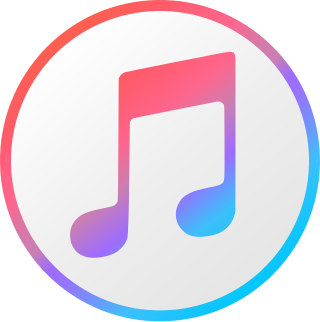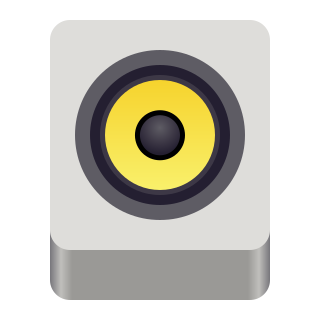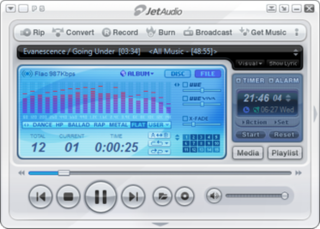
Windows Media Player, is the first media player and media library application that Microsoft developed to play audio and video on personal computers. It has been a component of the Microsoft Windows operating system, including Windows 9x, Windows NT, Pocket PC, and Windows Mobile. Microsoft also released editions of Windows Media Player for classic Mac OS, Mac OS X, and Solaris, but has since discontinued them.

Winamp is a media player for Microsoft Windows originally developed by Justin Frankel and Dmitry Boldyrev by their company Nullsoft, which they later sold to AOL in 1999 for $80 million. It was then acquired by Radionomy in 2014, now known as the Llama Group. Since version 2 it has been sold as freemium and supports extensibility with plug-ins and skins, and features music visualization, playlist and a media library, supported by a large online community.

iTunes is a software program that acts as a media player, media library, mobile device management utility, and the client app for the iTunes Store. Developed by Apple Inc., it is used to purchase, play, download and organize digital multimedia on personal computers running the macOS and Windows operating systems, and can be used to rip songs from CDs as well as playing content from dynamic, smart playlists. It includes options for sound optimization and wirelessly sharing iTunes libraries.

FL Studio is a digital audio workstation (DAW) developed by the Belgian company Image-Line. It features a graphical user interface with a pattern-based music sequencer. It is available in four different editions for Microsoft Windows and macOS.

Adobe Audition is a digital audio workstation developed by Adobe Inc. featuring both a multitrack, non-destructive mix/edit environment and a destructive-approach waveform editing view.

Renoise is a digital audio workstation (DAW) based upon the heritage and development of tracker software. Its primary use is the composition of music using sound samples, soft synths, and effects plug-ins. It is also able to interface with MIDI and OSC equipment. The main difference between Renoise and other music software is the characteristic vertical timeline sequencer used by tracking software.

OpenMPT is an open-source audio module tracker for Windows. It was previously called ModPlug Tracker, and was first released by Olivier Lapicque in September 1997.

RealPlayer, formerly RealAudio Player, RealOne Player and RealPlayer G2, is a cross-platform media player app, developed by RealNetworks. The media player is compatible with numerous container file formats of the multimedia realm, including MP3, MP4, QuickTime File Format, Windows Media format, and the proprietary RealAudio and RealVideo formats. RealPlayer is also available for other operating systems; Linux, Unix, Palm OS, Windows Mobile, and Symbian versions have been released.

Rhythmbox is a free and open-source audio player software, tag editor and music organizer for digital audio files on Linux and Unix-like systems.

MediaMonkey is a digital media player and media library application developed by Ventis Media Inc., for organizing and playing audio on Microsoft Windows and Android operating systems. MediaMonkey for Windows includes various management tools, and is extensible using plugins, while MediaMonkey for Android is an adjunct for sharing the library with Android devices. MediaMonkey is commonly displayed/marketed as a solution for managing large libraries of music.

Banshee was a cross-platform open-source media player, called Sonance until 2005. Built upon Mono and Gtk#, it used the GStreamer multimedia platform for encoding, and decoding various media formats, including Ogg Vorbis, MP3 and FLAC. Banshee can play and import audio CDs and supports many portable media players, including Apple's iPod, Android devices and Creative's ZEN players. Other features include Last.fm integration, album artwork fetching, smart playlists and podcast support. Banshee is released under the terms of the MIT License. Stable versions are available for many Linux distributions, as well as a beta preview for OS X and an alpha preview for Windows.
Podcasts, previously known as "audioblogs", have roots dating back to the 1980s. With the advent of broadband Internet access and portable digital audio playback devices such as the iPod, podcasting began to catch hold in late 2004. Today there are more than 115,000 English-language podcasts available on the Internet, and dozens of websites available for distribution at little or no cost to the producer or listener.

Zune was a brand of digital media products and services that was marketed by Microsoft from November 2006 until it was discontinued in June 2012. Zune consisted of a line of portable media players, a music subscription service known as Zune Music Pass plus Zune Marketplace for music, TV and movies, streaming services for the Xbox 360 game console, and the Zune software media player for Windows PCs which also acted as desktop sync software for Windows Phone.
The following comparison of audio players compares general and technical information for a number of software media player programs. For the purpose of this comparison, "audio players" are defined as any media player explicitly designed to play audio files, with limited or no support for video playback. Multi-media players designed for video playback, which can also play music, are included under comparison of video player software.

JetAudio is a shareware media player application for Microsoft Windows and Android released in 1997, that offers playback options for a wide range of multimedia file formats.

MusicBee is a freeware media player for playback and organization of audio files on Microsoft Windows, built using the BASS audio library.

Quod Libet is a cross-platform free and open-source audio player, tag editor and library organizer. The main design philosophy is that the user knows how they want to organize their music best; the software is therefore built to be fully customizable and extensible using regular expressions and boolean logic. Quod Libet is based on GTK and written in Python, and uses the Mutagen tagging library.

AIMP is a freeware audio player for Windows and Android, originally developed by Russian developer Artem Izmaylov. It supports a variety of audio codecs, and includes tools to convert audio files and edit their metadata. It also has the capability of installing user-made skins and plugins.
XMPlay is a freeware audio player for Windows. Initially released in 1998, it is often used as a reference player for tracker audio files.















